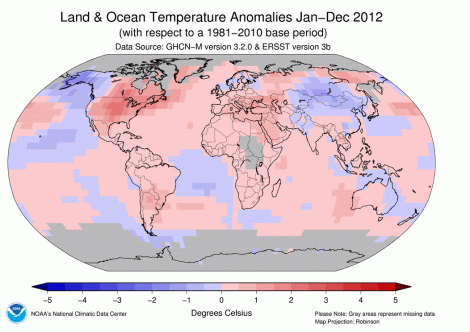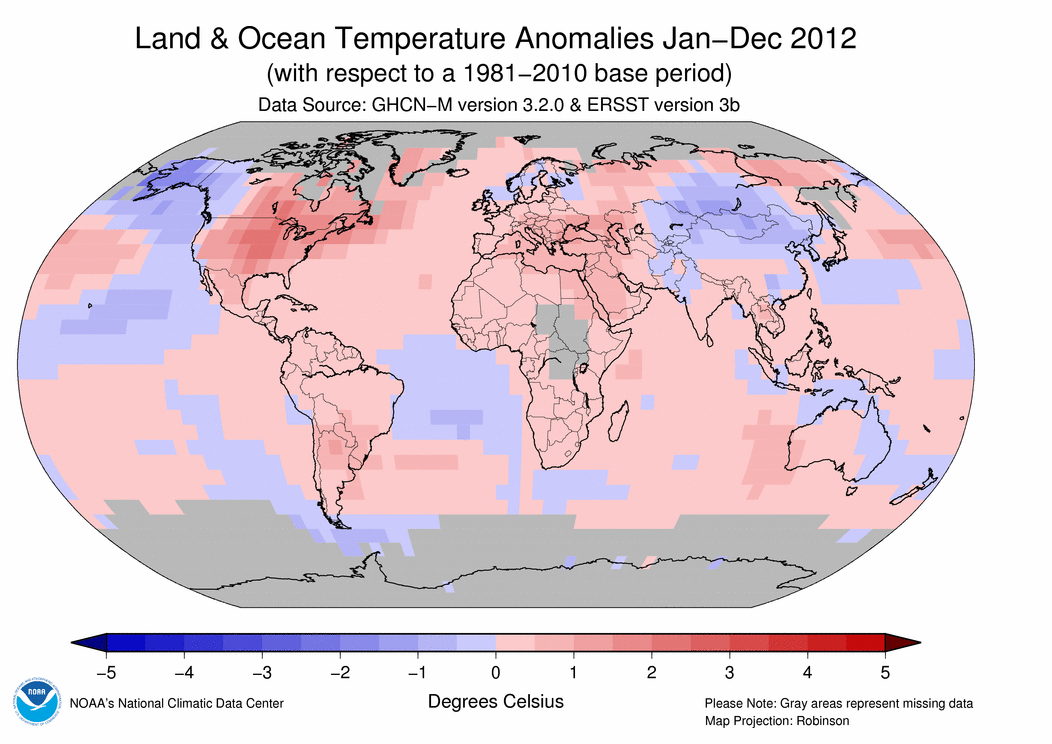This is the state of the climate as we know it now. 2012 was only the 10th-warmest year in recorded history around the world (though, of course, it was the warmest in U.S. history). Nonetheless, 2012 global land and sea temperatures were higher than every year in the 20th century, save one, 1998. Yet in terms of the 21st century, 2012 was one of the coldest.
Again, just to make the point: The hottest year in American history was one of the coldest worldwide this century.
Here’s the overview from the National Oceanic and Atmospheric Administration:
The globally-averaged temperature for 2012 marked the 10th warmest year since record keeping began in 1880. It also marked the 36th consecutive year with a global temperature above the 20th century average. The last below-average annual temperature was 1976. Including 2012, all 12 years to date in the 21st century (2001–2012) rank among the 14 warmest in the 133-year period of record.
Here’s how various regions of the world stacked up compared to 1981-2012 temperatures. Alaska was much colder; the rest of the country, much warmer.

More data points from the report:
- The global annual temperature has increased at an average rate of 0.06 degrees C (0.11 degrees F) per decade sine 1880 and at an average rate of 0.16 degrees C (0.28 degrees F) per decade since 1970.
- The 2012 worldwide land surface temperature was 0.90 degrees C (1.62 degrees F) above the 20th century average, making it the seventh warmest such period on record. The margin of error is ± 0.18 degrees C (0.32 degrees F).
- Major drought gripped important agricultural regions across the world during summer 2012. These regions included eastern Russia, Ukraine, Kazakhstan, and central North America.
- The United Kingdom had its second wettest year since records began in 1910, falling just 7.3 mm (0.29 inches) shy of the record wetness of 2000. Particularly notable, record dryness during March turned to record wetness in April.
- For all of 2012, Arctic sea ice extent was below average.
- The annual Arctic sea ice melting ended on September 16th, when the Arctic sea ice extent dropped to 1.32 million square miles (3.41 million square km), the lowest value ever recorded. The annual minimum extent was 49 percent below average and 0.29 million square miles (0.76 million square km) below the previous smallest extent which occurred in September 2007.
Again: all of this in one of the coldest years this century. By the time we get to 2100, the odds are good that 2012 will be considered to have been unusually cold. Be sure to tell your great-great-grandkids all about what life was like in the old, frigid days of what we once called the United States’ hottest year ever.



